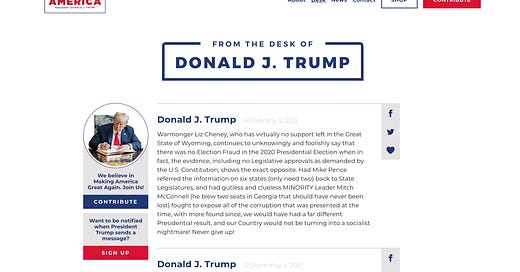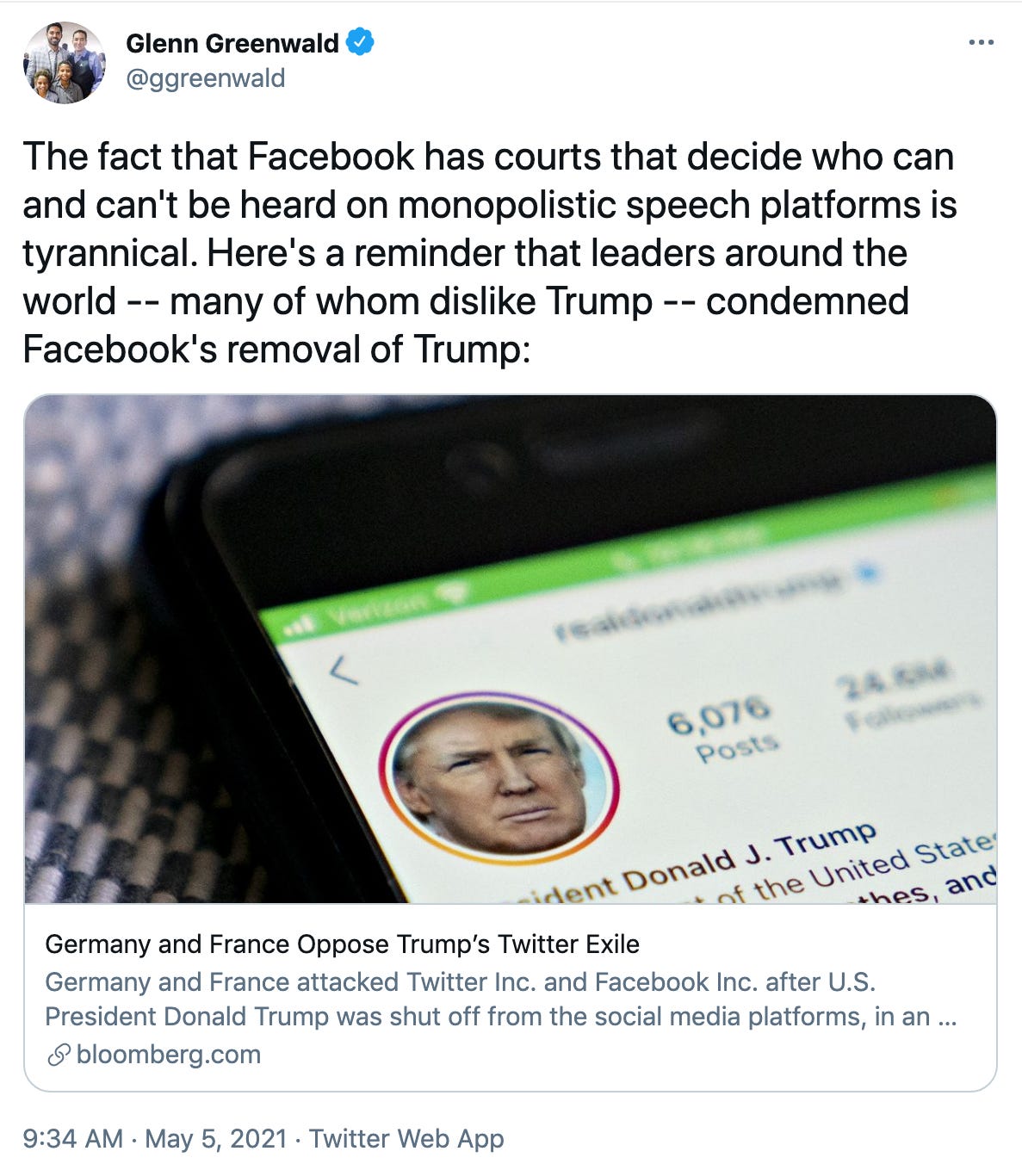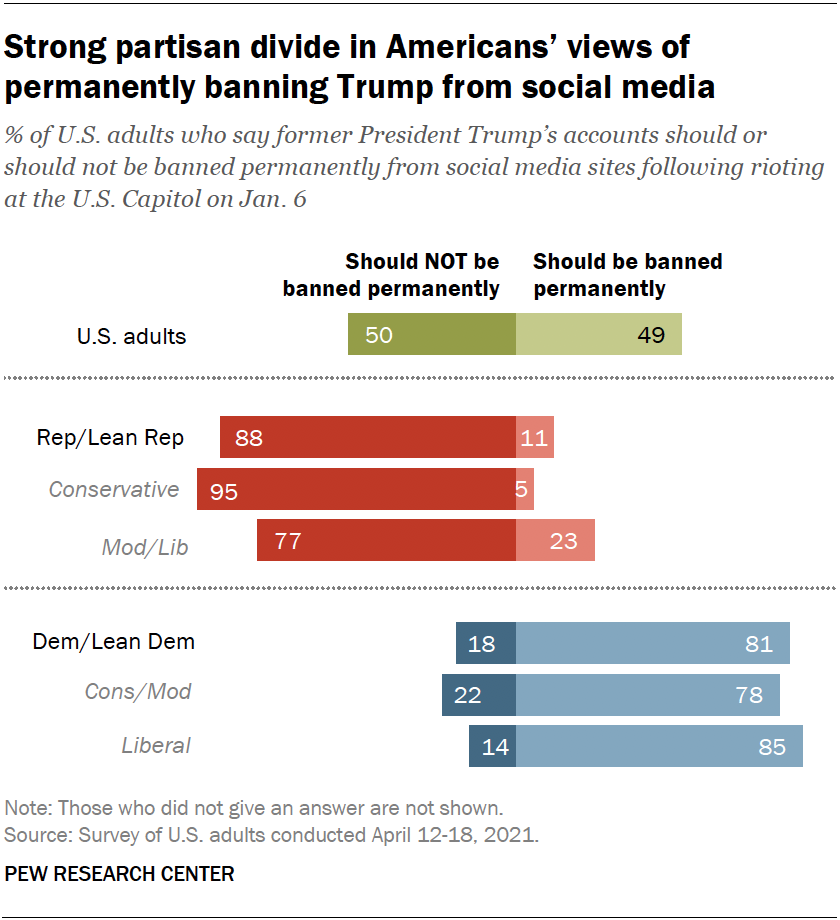Trump's Digital Fate Sealed? Plus Kristy Titus Interview + Brood X Cicadas Are Actually Good for Nature
New "Outsider on the Inside" dispatch.
Good morning!
Welcome to Outsider on the Inside. I hope this dispatch from in and around the nation’s capital on underreported topics finds you well.
If you’re just discovering my musings, here’s a backgrounder.
Here’s what I have for you today.
Is President Trump’s Social Media Fate Sealed?
Yesterday, former President Donald J. Trump announced his “return” to social media with the launch of a new communications platform.
From initial examination, it largely resembles a blog and not a social media outlet. Did you come away with this observation too?
Fox News offered more context behind Trump’s new website:
The technology appears to be powered by Campaign Nucleus— the "digital ecosystem made for efficiently managing political campaigns and organizations," created by his former campaign manager, Brad Parscale.
The space allows Trump to post, and allows followers to share the former president’s posts to Twitter and Facebook, however, the new platform does not have a feature to allow users to "reply" or engage with Trump’s posts.
Strangely enough, it in anticipation of today’s Facebook Oversight Board decision on the fate of Trump’s ability to post on Facebook and Instagram. Unfortunately for the former president, the Board kept his January 7th suspension in effect—for the time being.
Their official statement reads like this:
The Board has upheld Facebook’s decision on January 7, 2021, to restrict then-President Donald Trump’s access to posting content on his Facebook page and Instagram account.
However, it was not appropriate for Facebook to impose the indeterminate and standardless penalty of indefinite suspension. Facebook’s normal penalties include removing the violating content, imposing a time-bound period of suspension, or permanently disabling the page and account.
The Board insists that Facebook review this matter to determine and justify a proportionate response that is consistent with the rules that are applied to other users of its platform. Facebook must complete its review of this matter within six months of the date of this decision. The Board also made policy recommendations for Facebook to implement in developing clear, necessary, and proportionate policies that promote public safety and respect freedom of expression.
The Oversight Board also faulted Facebook for imposing an "indefinite” suspension—putting the decision-making on this matter back in their court. Could it mean a future return to the platform for 45 say, after 2023? Time will tell.
However, it was not appropriate for Facebook to impose an ‘indefinite’ suspension.
It is not permissible for Facebook to keep a user off the platform for an undefined period, with no criteria for when or whether the account will be restored.
In applying this penalty, Facebook did not follow a clear, published procedure. ‘Indefinite’ suspensions are not described in the company’s content policies. Facebook’s normal penalties include removing the violating content, imposing a time-bound period of suspension, or permanently disabling the page and account.
It is Facebook’s role to create necessary and proportionate penalties that respond to severe violations of its content policies. The Board’s role is to ensure that Facebook’s rules and processes are consistent with its content policies, its values and its human rights commitments.
In applying a vague, standardless penalty and then referring this case to the Board to resolve, Facebook seeks to avoid its responsibilities. The Board declines Facebook’s request and insists that Facebook apply and justify a defined penalty.
The Oversight Board’s decision
The Oversight Board has upheld Facebook’s decision to suspend Mr. Trump’s access to post content on Facebook and Instagram on January 7, 2021. However, as Facebook suspended Mr. Trump’s accounts ‘indefinitely,’ the company must reassess this penalty.
Within six months of this decision, Facebook must reexamine the arbitrary penalty it imposed on January 7 and decide the appropriate penalty. This penalty must be based on the gravity of the violation and the prospect of future harm. It must also be consistent with Facebook’s rules for severe violations, which must, in turn, be clear, necessary and proportionate.
If Facebook decides to restore Mr. Trump’s accounts, the company should apply its rules to that decision, including any changes made in response to the Board’s policy recommendations below. In this scenario, Facebook must address any further violations promptly and in accordance with its established content policies.
A minority of the Board emphasized that Facebook should take steps to prevent the repetition of adverse human rights impacts and ensure that users who seek reinstatement after suspension recognize their wrongdoing and commit to observing the rules in the future.
When it referred this case to the Board, Facebook specifically requested “observations or recommendations from the Board about suspensions when the user is a political leader.”
In a policy advisory statement, the Board made a number of recommendations to guide Facebook’s policies in regard to serious risks of harm posed by political leaders and other influential figures.
The Board stated that it is not always useful to draw a firm distinction between political leaders and other influential users, recognizing that other users with large audiences can also contribute to serious risks of harm.
While the same rules should apply to all users, context matters when assessing the probability and imminence of harm. When posts by influential users pose a high probability of imminent harm, Facebook should act quickly to enforce its rules. Although Facebook explained that it did not apply its ‘newsworthiness’ allowance in this case, the Board called on Facebook to address widespread confusion about how decisions relating to influential users are made. The Board stressed that considerations of newsworthiness should not take priority when urgent action is needed to prevent significant harm.
Facebook should publicly explain the rules that it uses when it imposes account-level sanctions against influential users. These rules should ensure that when Facebook imposes a time-limited suspension on the account of an influential user to reduce the risk of significant harm, it will assess whether the risk has receded before the suspension ends. If Facebook identifies that the user poses a serious risk of inciting imminent violence, discrimination or other lawless action at that time, another time-bound suspension should be imposed when such measures are necessary to protect public safety and proportionate to the risk.
The Board noted that heads of state and other high officials of government can have a greater power to cause harm than other people. If a head of state or high government official has repeatedly posted messages that pose a risk of harm under international human rights norms, Facebook should suspend the account for a period sufficient to protect against imminent harm. Suspension periods should be long enough to deter misconduct and may, in appropriate cases, include account or page deletion.
Here’s how social media reacted to today’s news:
On the other hand, Twitter is maintaining their position to permanently ban Trump from their platform.
Public opinion, however, is rather mixed on whether social media giants should ban the 45th president.
A recent Pew Research Center survey found respondents are evenly divided on this question (bolded for emphasis):
Americans are split on whether former President Donald Trump should be barred from social media. Some 49% of U.S. adults say Trump’s accounts should be permanently banned from social media, while half say they should not be. But views are deeply divided along partisan lines, according to a new Pew Research Center survey.
Here’s the political breakdown of the survey:
Republicans and Democrats hold deeply contrasting views of a lifetime ban for Trump. Just 11% of Republicans and Republican-leaning independents say Trump’s accounts should be permanently banned from social media, while 88% say they should not be. By comparison, 81% of Democrats and Democratic leaners say his accounts should be banned permanently. Roughly one-in-five Democrats (18%) do not support this type of ban on Trump’s accounts.
What say you? Should Facebook/Instagram eventually restore Trump’s posting privilege or leave the restrictions in place?
The Kristy Titus Interview
On Episode 173 of District of Conservation, I speak with “Pursue the Wild” host Kristy Titus.
Here’s Kristy’s biography:
Kristy was raised leading a pack string of mules into the backcountry of Oregon, experiencing the thrill of public land, fair chase, do-it-yourself western big game hunting. She is passionate in the support of wildlife and habitat conservation, serving as an Ambassador for The Rocky Mountain Elk Foundation and Safari Club International.
Kristy is a Second Amendment advocate serving on the National Rifle Association’s Board of Directors, the NRA Hunting and Wildlife Conservation Committee and the NRA Youth Programs Committee. She is an NRA certified Basic Pistol Instructor, Refuse To Be A Victim Instructor and Range Safety Officer. Kristy is a competitive shooter on Team Ruger, participating in the Precision Rifle Series and National Rifle League Series.
She hosts and produces Pursue The Wild, a digital series airing on Facebook, YouTube and Amazon TV. In her series, Kristy is educating viewers while inspiring movements that broaden the reach of conservation and strengthen support of the Second Amendment and increase shooting sports participation. Kristy is an outspoken Second Amendment advocate that has dedicated her life to teaching and promoting firearms, conservation and hunting.
In this episode, Kristy chronicles her journey in the outdoor industry, why digital TV programming is the future, legislation that concerns her, social media challenges for outdoor content creators, why the media must focus on good hunters, increased firearms purchases, and how to recruit and retain new hunters and gun owners.
Connect with Kristy here and follow her on Facebook, Instagram, Twitter, and YouTube.
Brood X Cicadas Are ACTUALLY Good for Nature?!
The Brood X cicadas are emerging all across the Eastern Seaboard. Once they emerge, they are expected to number in the trillions. (Oh my!) For context: An event like this takes place every 17 years.
Naturally, we’ve seen the doomsday reports here in the Washington, D.C. media market.
While there’s great uncertainty over Brood X cicadas, maybe their presence is actually welcomed?
WTOP (via AP) reports the emergence of cicadas is actually GOOD for nature:
But scientists say the arrival of Brood X is a sign that despite pollution, climate change and dramatic biodiversity loss, something is still right with nature. And it’s quite a show.
Here’s more on what to expect:
This is not an invasion. The cicadas have been here the entire time, quietly feeding off tree roots underground, not asleep, just moving slowly waiting for their body clocks tell them it is time to come out and breed. They’ve been in America for millions of years, far longer than people.
When they emerge, it gets noisy — 105 decibels noisy, like “a singles bar gone horribly, horribly wrong,” Cooley says. There are three distinct cicada species and each has its own mating song.
They aren’t locusts and the only plants they damage are young trees, which can be netted. The year after a big batch of cicadas, trees actually do better because dead bugs serve as fertilizer, Kritsky says.
People tend to be scared of the wrong insects, says University of Illinois entomologist May Berenbaum. The mosquito kills more people than any other animals because of malaria and other diseases. Yet some people really dread the cicada emergence, she said.
“I think it’s the fact that they’re an inconvenience. Also, when they die in mass numbers they smell bad,” Berenbaum says. “They really disrupt our sense of order.”
But others are fond of cicadas — and even munch on them, using recipes like those in a University of Maryland cookbook. And for scientists like Cooley, there is a real beauty in their life cycle.
“This is a feel-good story, folks. It really is and it’s in a year we need more,” he says. “When they come out, it’s a great sign that forests are in good shape. All is as it is supposed to be.”
That’s reassuring!
Thank you for reading! Let me know your thoughts and encourage your friends to subscribe to the newsletter too.
—Gabriella










